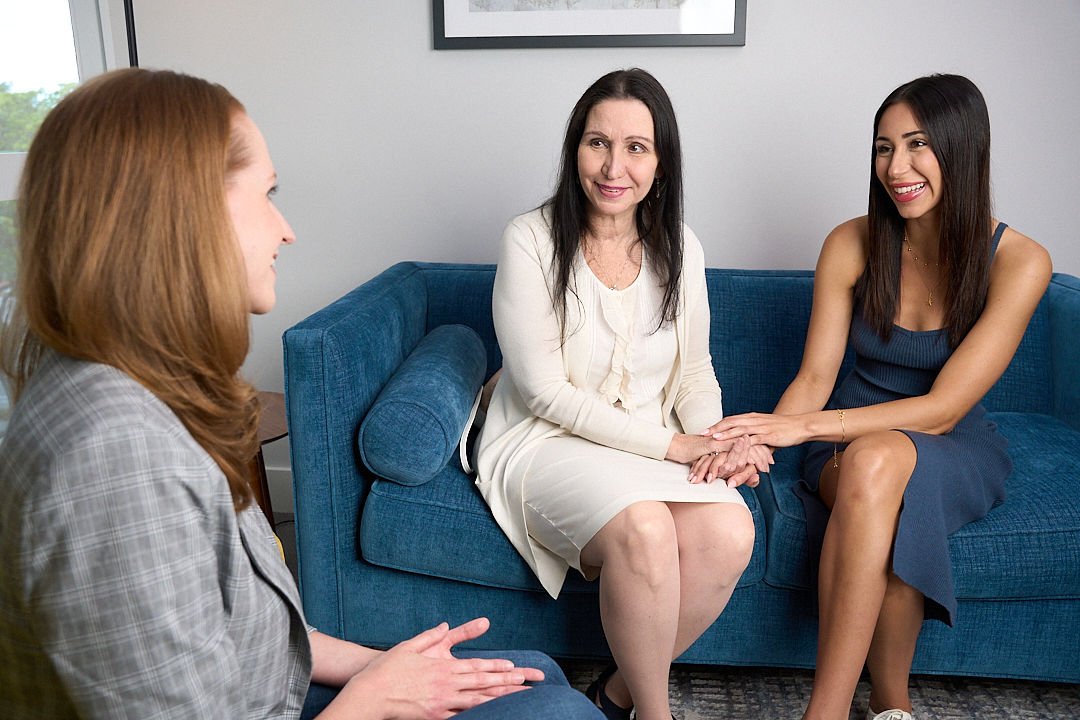
Feel better in a short amount of time with Cognitive Behavioral Therapy for depression.
It's normal to feel sad, but depression is when sadness or feeling down is excessive.
Cognitive Behavioral Therapy (CBT) is a great option for anyone struggling with depression (or another mood disorder, like bipolar disorder) who is ready to partner with a therapist to start improving their life.
CBT is a short-term, goal-based therapy that has proven to be very effective for treating depression - and most people feel better after just a few sessions. Plus, the results can be long-term.
How We Use CBT to Help with Depression
In Cognitive behavioral Therapy sessions with one of our practitioners, people are encouraged to talk about their depressive symptoms and how they affect them. We can help people uncover unhelpful thought patterns and identify how they may be negatively affecting their mood, beliefs about themselves, and their overall outlook on life.
The goal of CBT is to reduce the negative or unhelpful thoughts and behaviors common in those who experience depression by helping people change how they think - specifically by reframing thoughts and beliefs in ways that are more realistic and motivating.
Clients are encouraged to take an active role in their therapy, and an emphasis is placed on education, building problem-solving skills, reframing assumptions and beliefs, and connecting people to value based choices versus emotionally based choices.
Eventually, people will be able to apply the skills they’ve learned through CBT to their daily lives to better cope with their depressive symptoms, even after therapy ends.

How Mood Disorders Affect Us
Depression isn’t a personal weakness - it's a serious medical condition that can be treated. You don’t have to deal with it all on your own.
It is a mood disorder that can be brought on by factors out of our control: several stressful situations, adverse childhood experiences, biological factors, and societal factors - forms of systemic oppression like racism or sexism, difficulties in the workplace, and existential problems about the world and how it functions.
Depression affects people negatively in multiple ways. It can involve:
loss of interest or pleasure in situations you used to find pleasure or meaning
excessive sadness
focus on the negative
feeling unlovable, unworthy
concentration and memory issues
difficulty sleeping or excessive sleeping
monetary issues
sexual side effects
interpersonal difficulties
co-occurring substance use as a way to cope
limited potential at school or work
lack of energy
loss of motivation
social isolation
physical pain/feeling ill
irritability or excessive anger
excessive weight loss or gain
thoughts of suicide or suicide attempts
If you seem to have the inability to get out of a low or depressed mood or your negative feelings are interfering with your life, CBT for depression might be the next step to help you get “unstuck”.
CBT for Depression FAQ
-
We offer both in person and virtual appointments. Our in person appointments currently take place at our Orlando, FL office.
-
Most clients pay for our services out-of-pocket. Please contact our office to verify your coverage. Even if we can’t see you at our practice, we are happy to connect you with additional resources. We feel it is our job and responsibility to help you find the help you need.
-
We generally schedule weekly, 45 minute appointments for therapy.
If you are interested in more intensive therapy we offer several options, which can include multiple sessions per week and can range from 60 to 90 minutes or longer.
-
CBT is most effective for people when combined with medications like antidepressants. However, many people can benefit from CBT without taking medication. Experts say that a combination of medication and CBT is usually the most effective in helping a person overcome barriers but one of the advantages of CBT is that, unlike medication, it can last long after treatment has been discontinued.
-
Yes. As CBT clinicians we have a specific way of helping people, but we recognize that it's not the only way. If we feel another form of therapy outside of our scope of practice is helpful, we will refer you to our best resources.
If you want to incorporate other methods of helping or healing, we'll integrate that into your treatment or provide a referral to another provider.

Therapy Delivered With Respect, Empathy, and Compassion
We view all people as unique individuals who are doing the best they can to cope with the circumstances they are presented with. Although we are CBT specialists that help people manage their anxiety using the most current and effective treatments, we also recognize how privilege, power, unequal access to resources, prejudice, racism, and other systemic issues affect a person’s lived experience. We approach each relationship with the respect, empathy, and compassion that all people deserve.
Our practitioners have also received additional training and supervision in culturally competent practices, and continue to do so as part of participating in our group.
There is no “right time” to seek counseling. Take the next step today.






